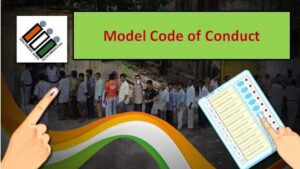
Introduction:
- The Model Code of Conduct (MCC) stands as a cornerstone of ethical conduct in Indian elections.
- Enforced by the Election Commission (EC), it outlines the standards of behavior expected from political parties and candidates during election campaigns.
- This blog delves into the origins, development, significance, and challenges surrounding the MCC, shedding light on its pivotal role in ensuring free and fair elections in India.
Origin and Development of the Model Code of Conduct:
- Kerala’s pioneering role in adopting a code of conduct for elections in 1960 set the stage for the MCC’s formalization.
- Over the years, the MCC has evolved, with revisions and additions to address emerging electoral challenges.
- Notably, in 1974, the EC released a formal MCC ahead of the mid-term general elections, marking a significant milestone in India’s electoral history.
Key Tenets of the MCC:
- The MCC encompasses various aspects of electioneering, including guidelines for public meetings, processions, and conduct on polling day.
- It emphasizes respectful conduct, constructive criticism of opponents’ policies, and refraining from personal attacks.
- Prohibitions against misuse of official machinery, financial grants, and ad hoc appointments ensure a level playing field for all parties.
Role of Political Parties in Shaping the MCC:
- Political parties play a crucial role in shaping the MCC, as it is a consensus document agreed upon by all major parties.
- Former Chief Election Commissioner SY Quraishi highlighted the collaborative effort of political parties in developing and upholding the MCC, underscoring its effectiveness in maintaining electoral integrity.
Significance of the MCC in Ensuring Fair Elections:
- The MCC serves as a bulwark against electoral malpractices, ensuring that elections are conducted in an honest, free, and fair manner.
- Despite lacking statutory backing, the Model Code of Conduct garners moral sanction and public support, making it an indispensable tool for maintaining electoral discipline and integrity.
Criticism and Challenges:
- While the Model Code of Conduct is widely acknowledged for its role in promoting ethical conduct, it has faced criticism for its lack of legal enforceability.
- The Goswami Committee’s recommendations to strengthen the MCC through statutory backing have not materialized, highlighting ongoing challenges in ensuring compliance and accountability.
Conclusion
- The Model Code of Conduct stands as a testament to India’s commitment to democratic principles and electoral fairness.
- Its evolution reflects the changing dynamics of Indian politics, while its enduring significance underscores its role as a guardian of electoral integrity. As debates persist regarding its legal enforceability, the Model Code of Conduct remains a cornerstone of India’s electoral democracy, embodying the collective aspirations for free, fair, and transparent elections.
People also ask
Q1: What is the Model Code of Conduct (MCC)?
Ans: The MCC is a set of guidelines issued by the Election Commission of India (ECI) to regulate the conduct of political parties and candidates during elections. It aims to ensure a level playing field, ethical campaigning, and fair electoral practices.
Q2: What is the purpose of the MCC?
Ans: The primary purpose of the MCC is to maintain the integrity of the electoral process by preventing malpractices such as bribery, misuse of government resources, and inflammatory campaigning. It promotes a culture of respect, fairness, and transparency in elections.
Q3: Is the MCC legally binding?
Ans: While the MCC does not have statutory backing, it is adhered to by political parties as a voluntary code of conduct. However, the EC has the authority to enforce compliance through its powers, such as the suspension or withdrawal of recognition of political parties for MCC violations.
Q4: What are some key provisions of the MCC?
Ans: The MCC prohibits the use of government machinery for electioneering, announcement of financial grants, and ad hoc appointments during the election period. It also regulates campaign activities, such as public meetings, processions, and advertisements, to ensure fairness and accountability.